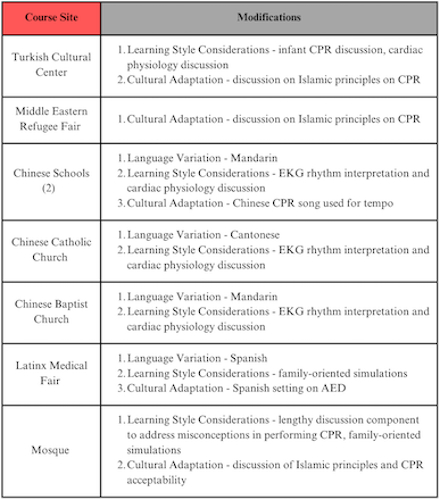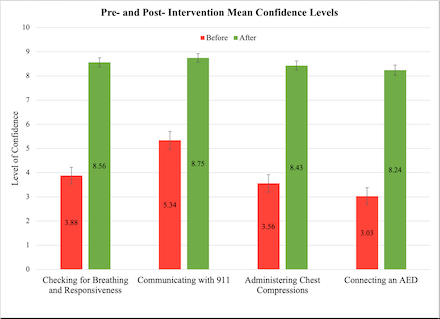Final ID: Su1106
Evaluating Culturally Competent Cardiopulmonary Resuscitation (CPR) Training in Urban Minority Communities
Abstract Body: Introduction
Timely resuscitation can triple the chance of survival for out-of-hospital cardiac arrest (OHCA) patients. Differences in bystander CPR rates between white and minority communities lead to significant racial and ethnic disparities in OHCA survival rates. Immigrant populations, in particular, face several educational barriers and are often excluded in community CPR trainings. Previous efforts have increased the inclusivity of CPR education for female and disabled citizens through targeted interventions. Significant opportunities exist to apply similar strategies and tackle community-level disparities.
Aim
To examine the impact of culturally competent CPR instruction on confidence levels and acceptability of CPR skills among minority citizen groups.
Methods
CPR cohorts were taught using a local emergency services syllabus. Through discussion with course site leaders, the syllabus was adapted in three categories: language variations, cultural adaptations, and/or consideration of cultural learning styles. A pre-post design was utilized to assess impact of culturally-tailored CPR training. Confidence and acceptability levels in performing CPR were measured using a digital survey. An unpaired t-test was used to analyze pre/post-course data. Trainings were held from November 2023 to May 2024.
Results
All participants were 18 years or older (n=217). The response rate was 36.7% (n=80). Confidence levels increased by 121% for checking for breathing and responsiveness (p<0.0001), 63.9% for communicating with 911 (p<0.0001), 137% for administering chest compressions (p<0.0001), and 172% for connecting an AED (p<0.0001). CPR acceptability improved, with participants reporting a 47.8% reduction in perceived difficulty post-course (p<0.0001).
Conclusions
Implementing culturally tailored CPR training significantly improved confidence in CPR skills and acceptability of CPR. Future experiments may compare outcomes between intervention and control CPR cohorts at more course sites.
Timely resuscitation can triple the chance of survival for out-of-hospital cardiac arrest (OHCA) patients. Differences in bystander CPR rates between white and minority communities lead to significant racial and ethnic disparities in OHCA survival rates. Immigrant populations, in particular, face several educational barriers and are often excluded in community CPR trainings. Previous efforts have increased the inclusivity of CPR education for female and disabled citizens through targeted interventions. Significant opportunities exist to apply similar strategies and tackle community-level disparities.
Aim
To examine the impact of culturally competent CPR instruction on confidence levels and acceptability of CPR skills among minority citizen groups.
Methods
CPR cohorts were taught using a local emergency services syllabus. Through discussion with course site leaders, the syllabus was adapted in three categories: language variations, cultural adaptations, and/or consideration of cultural learning styles. A pre-post design was utilized to assess impact of culturally-tailored CPR training. Confidence and acceptability levels in performing CPR were measured using a digital survey. An unpaired t-test was used to analyze pre/post-course data. Trainings were held from November 2023 to May 2024.
Results
All participants were 18 years or older (n=217). The response rate was 36.7% (n=80). Confidence levels increased by 121% for checking for breathing and responsiveness (p<0.0001), 63.9% for communicating with 911 (p<0.0001), 137% for administering chest compressions (p<0.0001), and 172% for connecting an AED (p<0.0001). CPR acceptability improved, with participants reporting a 47.8% reduction in perceived difficulty post-course (p<0.0001).
Conclusions
Implementing culturally tailored CPR training significantly improved confidence in CPR skills and acceptability of CPR. Future experiments may compare outcomes between intervention and control CPR cohorts at more course sites.
More abstracts on this topic:
A Patient and Family Advisory Council After Cardiac Arrest: A Patient-Centered Model of Community Engagement
Riker Richard, Chessa Frank, Sawyer Douglas, Seder David B., Weatherbee Mary, Daley Alison, Searight Meghan, Lord Christine, Lessard Amanda, Feutz Catherine, May Teresa, Gagnon David
Efficacy of Sacubitril-Valsartan Compared with Angiotensin-Converting Enzyme Inhibitor or Angiotensin-Receptor Blocker for Preventing Atrial Fibrillation Recurrence After Catheter Ablation: A Systematic Review and Meta-AnalysisBezerra Fernando, Rocha Dantas Clara, Sobreira Luis, Kendi Tsuchiya Sano Vitor, De Oliveira Macena Lobo Artur, Cardoso Jorge, Kelly Francinny, A De Moraes Francisco Cezar, Consolim Colombo Fernanda


